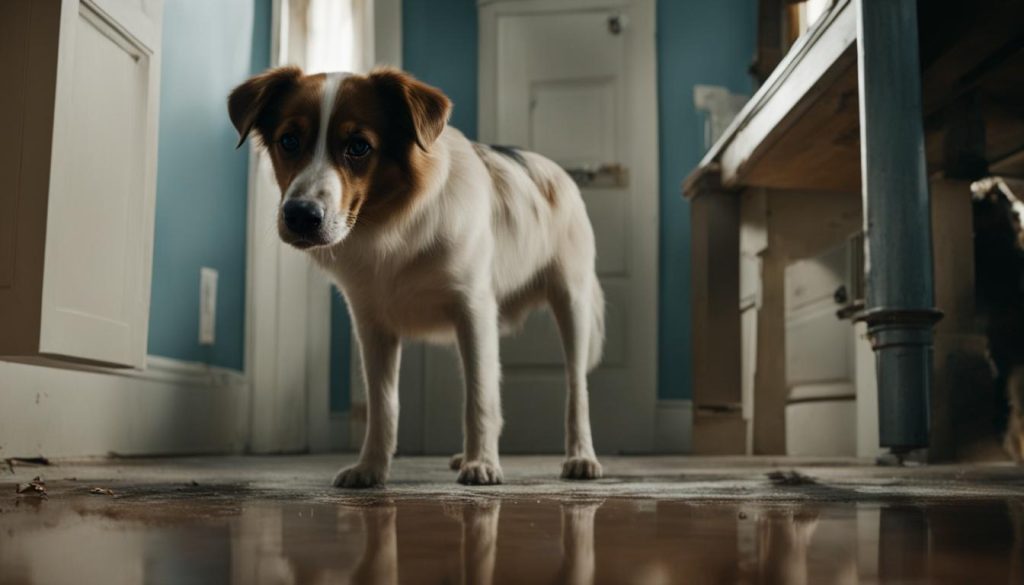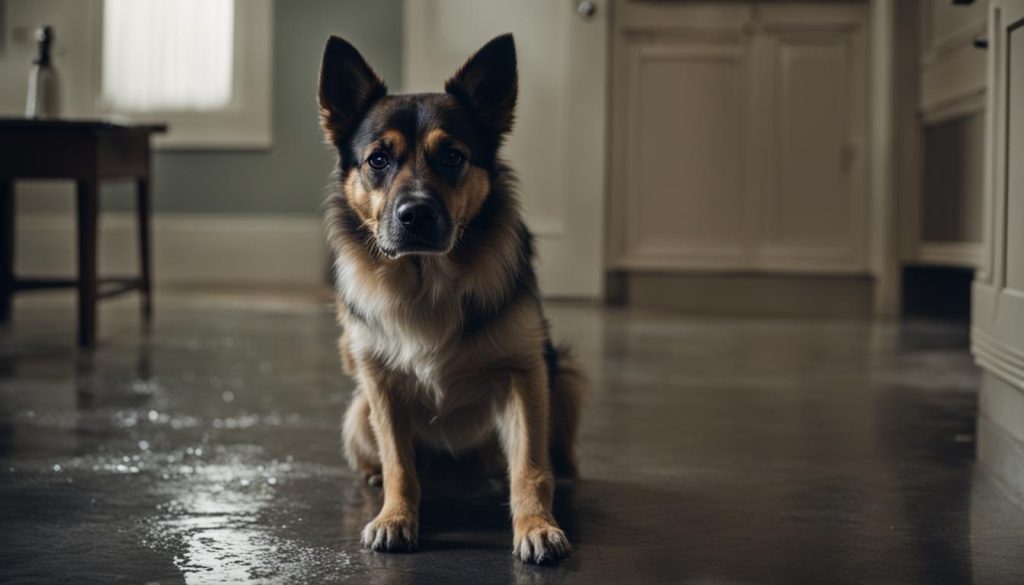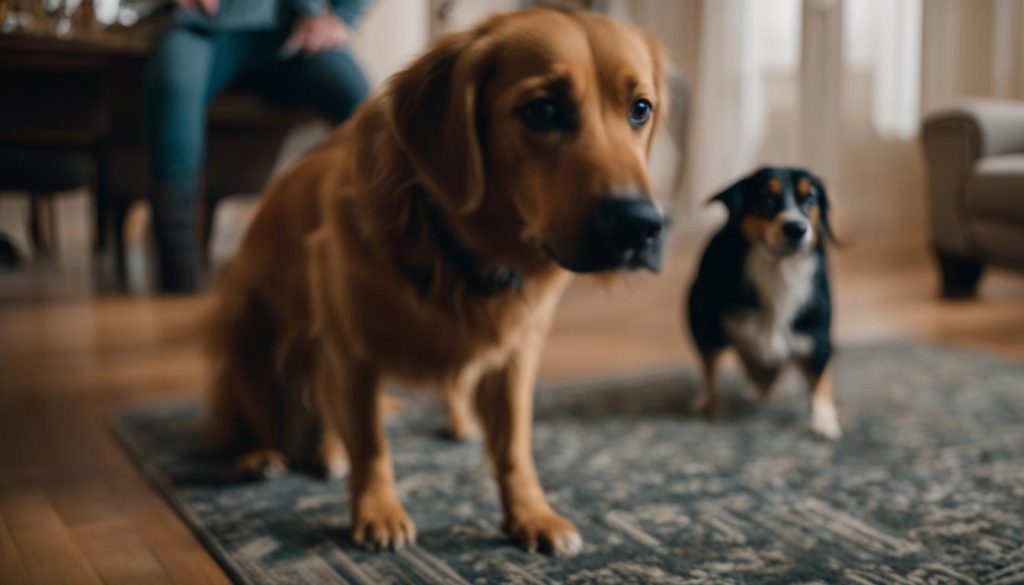If your previously house trained dog is suddenly peeing in the house, it could be a sign of an underlying issue. Medical problems such as kidney disease, urinary tract infections, and bladder stones can cause house soiling in pets. Other factors like territorial behavior, psychological stress, and boredom can also contribute to the behavior. It’s important to rule out any medical problems before addressing behavior-related issues.
Key Takeaways:
- Sudden peeing in the house may indicate underlying medical issues such as kidney disease or urinary tract infections.
- Territorial behavior, psychological stress, and boredom can also contribute to house soiling in female dogs.
- It’s important to consult with a veterinarian to rule out medical causes before addressing behavior-related issues.
- Proper training, mental and physical stimulation, and a comfortable environment can help prevent house soiling.
- Punishment and scolding are not effective solutions and can worsen the behavior.
Common Medical Causes of House Soiling in Female Dogs
When your female dog starts suddenly peeing in the house, it’s important to consider the potential medical causes behind this behavior. Several medical conditions can contribute to house soiling in female dogs, including urinary tract infections, bladder stones, kidney disease, and urinary incontinence.
Urinary tract infections (UTIs) are common in dogs and can cause frequent urination, discomfort, and the urge to urinate more often. Bladder stones, on the other hand, can create blockages or irritation in the urinary tract, leading to bladder control issues. Kidney disease can affect the dog’s ability to filter waste products from the blood, which can manifest as increased urination or accidents in the house.
Urinary incontinence, a condition characterized by the inability to control urine flow, is more prevalent in older female dogs and can be caused by factors such as weakened bladder muscles, hormonal imbalances, or spinal cord injuries. Dogs with urinary incontinence may leak urine or experience involuntary urination while resting or during physical exertion.
Medical Conditions Leading to House Soiling in Female Dogs:
- Urinary tract infections
- Bladder stones
- Kidney disease
- Urinary incontinence
| Medical Condition | Symptoms |
|---|---|
| Urinary tract infections | Frequent urination, discomfort, blood in urine |
| Bladder stones | Urinary accidents, straining to urinate, blood in urine |
| Kidney disease | Increased thirst, increased urination, weight loss |
| Urinary incontinence | Involuntary urination, urine leakage while resting or during exercise |
If you suspect that a medical condition is causing your female dog to soil the house, it’s crucial to consult with a veterinarian. A thorough examination, diagnostic tests, and appropriate treatment options can help address the underlying medical issue and alleviate the house soiling behavior.

Behavioral Causes of House Soiling in Female Dogs
When a female dog starts peeing in the house, it can be frustrating and puzzling for pet owners. In some cases, the cause may not be a medical issue, but rather a behavioral one. Understanding the behavioral causes of house soiling in female dogs is essential in addressing the problem effectively.
Territory Marking
One common behavioral cause of house soiling in female dogs is territory marking. Dogs use urine to mark their territory and communicate with other animals. Female dogs may mark their territory indoors if they sense a threat or perceive changes in their environment, such as the presence of new pets or guests in the home. This behavior is more commonly seen in intact female dogs, as they have higher levels of certain hormones that drive marking behavior.
Anxiety and Stress
Anxiety and stress can also contribute to house soiling in female dogs. Dogs may urinate indoors as a response to feeling anxious or stressed. Situations such as separation from their owners, loud noises, changes in routine, or the introduction of new pets or family members can all trigger anxiety in dogs. Addressing the underlying source of anxiety and providing appropriate support can help alleviate the behavior.
Training Setbacks
Even well-trained dogs can experience setbacks in their house training. Events such as illness, changes in routine, or insufficient reinforcement of house training can lead to house soiling. Dogs may forget or struggle to associate the appropriate time and place for eliminating waste. Reinforcing positive house training techniques and consistency can help overcome training setbacks and prevent future accidents.
In summary, behavioral causes such as territory marking, anxiety and stress, and training setbacks can contribute to house soiling in female dogs. Understanding these behavioral factors is crucial in addressing the issue effectively and providing the necessary support and training to prevent further accidents.
Additional Factors Contributing to House Soiling in Female Dogs
Aside from medical and behavioral causes, there are other factors that can contribute to house soiling in female dogs. These factors include boredom and inadequate training. Dogs that are bored or not properly stimulated may engage in destructive behaviors, including house soiling. It’s important for dog owners to provide mental and physical stimulation for their pets to prevent such behaviors from occurring.
Incomplete or inadequate training can also lead to accidents in the house. Consistent and positive reinforcement-based training methods can help prevent house soiling. It’s important to establish a regular bathroom routine for your dog and reward them for appropriate elimination. Additionally, creating a designated area outside for bathroom breaks can also aid in proper house training.
It’s crucial for dog owners to understand that accidents can happen, especially during the house training process. Patience and consistent training are key when addressing house soiling issues. Punishment or scolding will only create fear or anxiety in the dog, potentially exacerbating the problem. Instead, focus on reinforcing positive behaviors and providing a safe and comfortable environment for your female dog.
Table: House Training Tips
| Tip | Description |
|---|---|
| Establish a Routine | Set a regular schedule for bathroom breaks to encourage consistent elimination habits. |
| Positive Reinforcement | Reward your dog with treats or praise when they eliminate in the appropriate area. |
| Designated Bathroom Area | Create a specific spot outside for your dog to go potty and consistently take them to that area. |
| Supervision | Keep a close eye on your dog, especially during the house training process, to prevent accidents. |
| Consistency | Stick to the established routine and training methods to reinforce good habits. |
By following these house training tips and addressing any underlying medical or behavioral issues, you can effectively manage and prevent house soiling in your female dog. Remember, patience, consistency, and positive reinforcement are key in creating a well-trained and well-behaved pet.
Identifying the Cause of House Soiling in Female Dogs
If your female dog is suddenly peeing in the house, it’s important to determine the underlying cause. Identifying the cause will help in developing effective solutions and managing the behavior. Here are some factors to consider:
Medical Factors:
Medical issues can contribute to house soiling in female dogs. Conditions such as urinary tract infections, bladder stones, kidney disease, and age-related incontinence can cause discomfort and lead to accidents indoors. If your dog is exhibiting sudden house soiling behavior, it’s crucial to consult with a veterinarian to rule out any medical causes.
Behavioral Factors:
Behavioral issues can also play a role in house soiling. Female dogs may engage in territory marking, especially if there are changes in the home or the presence of new pets. Anxiety and stress can also contribute to house soiling behaviors. Additionally, training setbacks or loss of house training can result in accidents indoors. Observing your dog’s behavior and identifying any changes or triggers can help pinpoint the behavioral factors contributing to house soiling.
Environmental Factors:
Environmental factors such as boredom and inadequate training can contribute to house soiling. Dogs that are not properly stimulated or lack mental and physical exercise may engage in destructive behaviors, including urinating indoors. Incomplete or inadequate training can also lead to accidents in the house. Providing proper mental and physical stimulation for your dog and reinforcing consistent training methods can help prevent house soiling.
By evaluating both medical and behavioral factors, you can better understand why your female dog is peeing indoors. This knowledge will guide you in implementing appropriate strategies to address the issue. Remember to remain patient and seek professional assistance if needed.
Managing House Soiling in Female Dogs
If your female dog is experiencing house soiling issues, there are several strategies you can employ to manage this behavior. The approach you take will depend on whether the underlying cause is medical or behavioral. It’s important to remember that patience and consistency are key when addressing house soiling in dogs.
Managing Medical Causes
If your female dog’s house soiling is due to a medical condition, it’s crucial to work closely with your veterinarian to identify and treat the issue. The table below provides an overview of common medical causes and possible management options:
| Medical Cause | Possible Management Options |
|---|---|
| Urinary tract infection | Antibiotics prescribed by veterinarian |
| Bladder stones | Surgical removal or dietary changes |
| Kidney disease | Medication and dietary modifications |
| Urinary incontinence | Medication, hormone therapy, or surgery |
Please note: Consult with your veterinarian to determine the appropriate management options based on your dog’s specific condition.
Addressing Behavioral Causes
If the house soiling is due to behavioral issues, the following strategies can help manage the behavior:
- Providing an appropriate outlet for marking behavior: Consider using pee pads or designated outdoor areas for your dog to mark.
- Addressing anxiety or stress: Identify potential triggers and work on reducing them through behavior modification techniques or professional help.
- Reinforcing house training: Use positive reinforcement methods, such as rewards and praise, to encourage desired behavior and discourage house soiling.
Remember, punishment or scolding is not effective and can worsen the behavior. Instead, focus on positive reinforcement and create a safe and comfortable environment for your dog.

Professional Assistance
If you’re struggling to manage your female dog’s house soiling despite your best efforts, consider seeking professional help. A veterinarian or professional dog trainer can provide guidance tailored to your dog’s specific needs. They can help develop a customized training plan, address any underlying behavioral issues, and offer additional strategies for managing house soiling.
By taking a proactive approach and utilizing the appropriate management techniques, you can effectively address and minimize house soiling in your female dog. Remember to remain patient, consistent, and provide a positive and supportive environment for your furry friend.
Prevention Strategies for House Soiling in Female Dogs
Preventing house soiling in female dogs starts with proper house training. Consistency, patience, and positive reinforcement are key in establishing good habits. Here are some effective prevention strategies:
- Establish a routine: Dogs thrive on routine, so establish a consistent schedule for feeding, exercise, and bathroom breaks. Take your dog outside at regular intervals, especially after meals and naps.
- Supervise and crate train: When you can’t directly supervise your dog, utilize a crate to prevent accidents. Gradually introduce your dog to the crate and ensure it is a comfortable and safe space.
- Use positive reinforcement: Reward your dog with treats, praise, and affection when they eliminate outside. This helps reinforce the desired behavior and signals to your dog that they are doing the right thing.
- Clean up accidents properly: If your dog does have an accident indoors, clean it up using an enzymatic cleaner to remove any lingering odors. This will help prevent your dog from being attracted to the same spot again.
- Monitor water intake: While it’s important to provide your dog with fresh water, monitoring their intake can help prevent excessive urination. Consult with your veterinarian to determine the appropriate amount of water for your dog’s size and activity level.
Remember, prevention is key when it comes to house soiling in female dogs. By implementing these strategies and being consistent in your training efforts, you can help ensure a clean and accident-free environment for both you and your furry friend.
Effective Solutions for House Soiling in Female Dogs
When it comes to resolving house soiling issues in female dogs, the appropriate solutions will depend on the underlying cause. Whether it’s a medical issue or a behavioral problem, there are steps you can take to address the issue and prevent further accidents.
If your female dog is experiencing house soiling due to a medical condition, such as a urinary tract infection or bladder stones, it’s important to seek veterinary assistance. The veterinarian can provide the necessary treatment and management options to alleviate the problem. It may involve medications, dietary changes, or even surgery, depending on the specific condition.
For behavioral causes of house soiling, such as territorial marking or anxiety-related accidents, behavior modification techniques can be effective. Consult with a professional dog trainer or behaviorist to develop a tailored plan to address these issues. Environmental management, such as using pet-safe deterrent sprays or providing designated areas for elimination, can also help redirect the behavior.

| Solution | Description |
|---|---|
| Positive reinforcement training | Use rewards and praise to reinforce desired behavior, such as going potty outside. |
| Consistent schedule | Establish a routine for bathroom breaks and stick to it, reducing the likelihood of accidents. |
| Environmental enrichment | Provide mental and physical stimulation to prevent boredom and destructive behaviors. |
| Addressing anxiety | Identify and address any sources of stress or anxiety in your dog’s environment. |
Remember, patience and consistency are key when dealing with house soiling in female dogs. Punishment or scolding can worsen the behavior and create fear or anxiety in your pet. Instead, focus on positive reinforcement, provide a safe and comfortable environment, and seek professional help if needed. With the right approach, you can effectively manage and resolve house soiling issues in your female dog.
Seeking Veterinary Assistance for House Soiling in Female Dogs
If your female dog is suddenly peeing in the house and you are unable to identify or address the underlying cause, it’s important to seek veterinary assistance. A veterinarian can perform a thorough examination, run diagnostic tests, and provide guidance on management and treatment options. They can also help rule out any medical conditions that may be contributing to the house soiling behavior.
When you consult with a veterinarian, they will take into consideration your dog’s medical history, conduct a physical examination, and may recommend additional tests such as urine analysis, blood work, or imaging studies. These diagnostic tests can help identify any underlying medical conditions that could be causing the house soiling behavior. Once a diagnosis is made, the veterinarian can provide appropriate treatment options.
In cases where the house soiling behavior is due to urinary incontinence, the veterinarian may recommend medications that help control bladder function. They may also suggest lifestyle modifications such as frequent bathroom breaks, using doggie diapers or pads, or implementing environmental changes to accommodate your dog’s needs. In some cases, surgery may be necessary to address certain medical conditions contributing to the house soiling behavior.
| Benefits of Seeking Veterinary Assistance | Reasons to Consult a Veterinarian |
|---|---|
| Accurate Diagnosis: A veterinarian can accurately diagnose the underlying cause of the house soiling behavior through a thorough examination and diagnostic tests. | Medical Conditions: House soiling can be a symptom of various medical conditions that require veterinary treatment. |
| Tailored Treatment: Veterinarians can provide personalized treatment plans based on the specific needs of your dog, taking into account their medical history and current condition. | Behavioral Factors: A veterinarian can help determine if the house soiling behavior is due to behavioral factors and provide guidance on behavior modifications. |
| Preventive Measures: A veterinarian can suggest preventive measures to help manage and minimize the occurrence of house soiling in the future. | Expert Advice: Veterinarians have the knowledge and expertise to guide you in managing and addressing the house soiling behavior effectively. |
Seeking veterinary assistance is crucial in ensuring the well-being and health of your female dog. By working closely with a veterinarian, you can address the underlying causes of house soiling and develop a comprehensive plan to manage and resolve the behavior. Remember to provide all relevant information about your dog’s symptoms, behavior, and any changes in their environment to help the veterinarian make an accurate diagnosis and provide appropriate treatment options.
Tips for Supporting Dogs with House Soiling Issues
Dealing with house soiling in female dogs can be challenging, but it’s important to provide support and understanding. Punishment or scolding can worsen the behavior and create fear or anxiety in the dog. Instead, focus on positive reinforcement, consistency, and creating a safe and comfortable environment. Seek professional help if needed, and be patient as you work towards resolving the issue.
Here are some tips to support dogs with house soiling issues:
1. Positive Reinforcement:
Use rewards such as treats, praise, and petting to reinforce good behavior. When your dog eliminates outside or in the appropriate area, reward them immediately to help them understand what is expected.
2. Consistency:
Stick to a regular schedule for feeding, bathroom breaks, and exercise. Establishing a routine can help your dog anticipate when and where they should eliminate.
3. Safe Environment:
Create a comfortable and stress-free environment for your dog. Provide a designated area with appropriate bedding, toys, and access to water to help reduce anxiety and promote relaxation.
4. Professional Assistance:
If your dog’s house soiling issues persist or worsen, consider consulting with a professional dog trainer or behaviorist. They can offer expert guidance and develop a tailored plan to address the underlying causes of the behavior.
Remember, it’s essential to be patient and understanding when dealing with house soiling in female dogs. With consistency, positive reinforcement, and the right support, you can help your dog overcome this issue and create a harmonious living environment.
Table: Common Mistakes to Avoid when Dealing with House Soiling in Female Dogs
| Mistake | Explanation |
|---|---|
| Punishing the Dog | Punishment can worsen the behavior and create fear or anxiety in the dog. |
| Inconsistency | Not sticking to a regular schedule for feeding, bathroom breaks, and exercise can confuse the dog. |
| Lack of Supervision | Leaving the dog unsupervised for extended periods can lead to accidents. |
| Ignoring Medical Causes | Failing to rule out medical issues can prevent effective treatment for the behavior. |
Wrapping Up
House soiling in female dogs can be a frustrating issue for pet owners to deal with. However, by understanding the potential causes and taking the appropriate steps, it is possible to address and resolve the problem.
It’s important to remember that sudden dog peeing indoors can be a sign of underlying medical issues or behavioral problems. Consulting with a veterinarian is crucial to rule out any medical conditions and receive proper guidance.
Whether it’s urinary tract infections, anxiety, or training setbacks, identifying the root cause is essential in finding effective solutions. From implementing behavior modification techniques to providing mental and physical stimulation, there are strategies available to help manage and prevent house soiling.
By remaining patient, consistent, and supportive, it is possible to create a positive environment for your female dog and address the issue of sudden dog peeing. Remember, seeking professional assistance if needed and maintaining a positive and understanding approach will greatly contribute to the success of resolving the problem.
FAQ
What are the common medical causes of house soiling in female dogs?
Medical issues such as urinary tract infections, bladder stones, kidney disease, and arthritis or age-related incontinence can lead to house soiling in female dogs.
What are the behavioral causes of house soiling in female dogs?
Behavioral causes can include territorial marking, anxiety, and loss of house training.
What are the additional factors contributing to house soiling in female dogs?
Boredom and inadequate training can also contribute to house soiling in female dogs.
How can I identify the cause of house soiling in my female dog?
To identify the cause, it’s important to evaluate both medical and behavioral factors and observe any changes in the home.
How can I manage house soiling in my female dog?
Management strategies can include addressing medical conditions, providing an appropriate outlet for marking behavior, and reinforcing house training.
What are some prevention strategies for house soiling in female dogs?
Proper house training, mental and physical stimulation, and addressing sources of stress or anxiety can help prevent house soiling.
What are effective solutions for house soiling in female dogs?
Solutions will depend on the underlying cause and can include medical treatment, behavior modification techniques, and positive reinforcement training.
When should I seek veterinary assistance for house soiling in my female dog?
If you are unable to identify or address the underlying cause, it’s important to seek veterinary assistance for a thorough examination and guidance on management and treatment options.
How can I support my female dog with house soiling issues?
Focus on positive reinforcement, consistency, and creating a safe and comfortable environment. Seek professional help if needed and be patient as you work towards resolving the issue.






